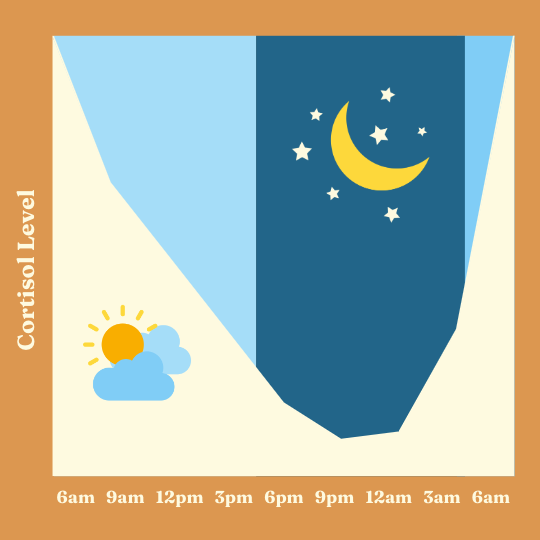Cortisol & Sleep
How and why does stress impact our sleep?
Chronic stress is now widely understood as a major causative factor of ill-health including mental health disorders, hormone imbalance, digestive dysfunction, and ties in with another major cause of poor well-being – sleep. Our stress hormone cortisol impacts the body’s ability to rest, digest, and repair. With increasing and unmanaged stress levels tied with poor sleep quality, we are stuck in a state of alertness triggered by elevated cortisol known as our evolutionary ‘fight or flight’ response. High stress will cause our blood pressure to increase, further increasing cortisol, which then further increases blood pressure. This will eventually start to reduce levels of growth hormone which is responsible for the repair of the body and blood vessels. Left unmanaged, this can lead to issues such as cardiovascular disease and metabolic disorders.
Now, on the relationship between sleep & stress…
Below is a chart of a healthy cortisol pattern:
As you can see, cortisol should be highest just before we wake to help us to feel energised in the morning. It should then decrease in the evening when we are getting ready to sleep. When cortisol is elevated excessively or for too long, it will start to become dysregulated.
Cortisol that is too high in the evening will block our sleep hormone melatonin from being released, as they provide a counterbalancing effect. The alternating cortisol and melatonin production comprises the light-controlled circadian rhythm. When we view light in the morning our adrenal glands will release cortisol, compared to at night where the darkness triggers melatonin release from the brain. This is why it’s so important to get sunlight in the morning and to avoid harsh light in the evening. Cortisol will also impact the counterbalance of adrenaline and GABA (responsible for a sense of ‘calmness’). Which will also impact sleep onset, maintenance, and overall sleep quality. One other major consideration is our blood sugar levels. If these are dysregulated, they may drop during sleep which triggers a spike in cortisol to boost blood sugar levels back up. This jump in cortisol will very likely lead to you waking up during the night and impacting sleep quality.
This can all seem quite overwhelming. However, luckily there are quite a few things that you can do to optimise your cortisol, to positively impact your energy during the day and sleep in the evening.
• Optimising your night routine – more on this to come!
• View sunlight within the first 30 minutes of waking.
• Exercise during the day (not too close to bedtime).
• Prioritise protein intake (aim for at least 1g per kg of bodyweight daily).
• Avoid stimulating foods such as coffee, refined sugar, and alcohol.
• Addressing magnesium deficiency, if applicable.
• Herbal supplementation (such as a tea or naturopathic herbal tincture) or a personalised nutraceutical compound to address cortisol levels.
As with many elements of our health, poor sleep can be caused by several factors. Therefore, when the foundational approaches aren’t doing the trick, I would always suggest consulting with a qualified health professional for an individualised treatment plan.


